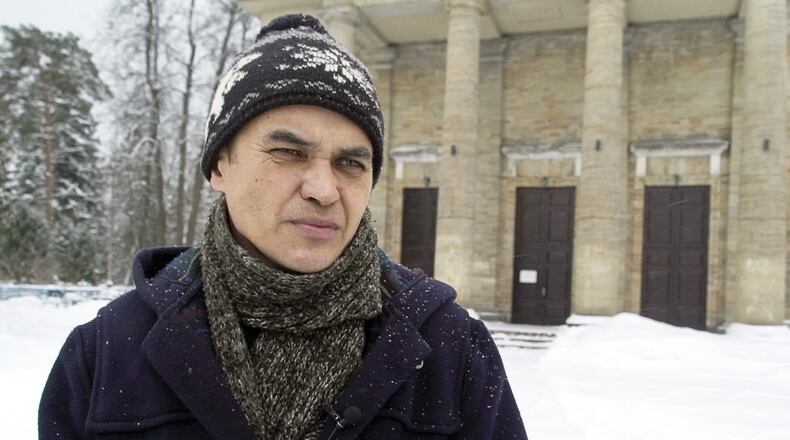A Russian "troll farm" accused of meddling in the U.S. presidential election spread criticism of U.S. Rep. John Lewis, repeatedly bashed Atlanta-based CNN, and helped spread messages on voter irregularities and police shootings in Georgia, an Atlanta Journal-Constitution analysis has found.
Georgia — the state, not the former Soviet republic — was on the minds of more than 90 supposed Twitter users linked to the Russian cyber-propaganda outfit known as the Internet Research Agency. Their tweets were among 200,000 recently deleted by the social media service but recovered and published by NBC News.
Russians behind the accounts sometimes posed as Atlantans and tweeted out links to national and local news stories. Some went further and tried even harder to sound authentically Atlantan, tweeting that they were listening to the rhymes of Killer Mike and Big Boi and showing an interest in the Falcons' draft picks.
One even retweeted that preference for Pepsi over Coke is a deal breaker in a new lover.
“Georgia is in my heart #PerfectStateIn5Words,” user @michellearry tweeted in April 2015, adding “Atlanta is the capital of the world.”
But they also pushed out a conspiracy theory about the assassination of Dr. Martin Luther King Jr., amplified the message that U.S. Rep. Hank Johnson had likened Jewish West Bank settlers to "termites" and sent dozens of tweets denouncing CNN as "fake news."
The troll tweeters seemed intent on fomenting dissent by playing both sides of the fence on controversial issues.
The AJC found more than 1,500 troll farm tweets referencing Georgia- or Atlanta-related news, people or institutions. Most leaned toward conservative-leaning political and social messages, made by users with Twitter descriptions like “True Conservative Christian Patriot” and “Lover of Life and Israel, Jesus and Country Music! Conservative Christian!”
But other posts, made by online personas with names like @Blk_Voice and @BleepThePolice, took directly opposite points of view. Twitter profiles for those and other accounts stated support for the Black Lives Matter movement and slavery reparations.
Among those targeted by the troll farm was Lewis, the Atlanta Democrat in his 16th term in Congress who drew President Trump's ire last year when he said he didn't see Trump as "a legitimate president."
The civil rights icon was referenced in more than 70 troll farm tweets, the AJC found. More than half cast him in a negative light, including deeming him a “damned liar,” “race pimp,” and “race-baiter.”
“Black pastor who marched with John Lewis says this time he’s on the ‘wrong side of history,’” tweeted @tpartynews in mid-January 2017.
More than a dozen other tweets described Lewis positively. One item retweeted nearly 1,300 times included a link to video of Lewis accepting the National Book Award and telling how, as a youngster in segregated Alabama, he had been denied a library card.
The AJC contacted Lewis’ office for comment this week but had not received a response by publication time. Johnson’s office declined to comment.
The trolls also took both sides in spreading news and commentary on police-involved shootings.
One 2015 tweet by @screamymonkey spread the word that Atlanta's police chief had admitted officers did not search carefully enough an armed woman later shot to death by officers. The details of that incident mirror the case of Alexia Christian, 26, who was fatally shot after she fired a handgun while in the back of an Atlanta police car near Underground Atlanta that year.
Another tweet carrying the hashtags "#PoliceBrutality" and "#BlackLivesMatter" appeared to reference the 2016 death of Jamarion Robinson, also 26, who was shot by officers on a U.S. Marshal's task force serving an arrest warrant in East Point.
Meanwhile, another tweet said Black Lives Matter activists “and [President] Obama (were) destroying every civil rights action MLK worked for.” And the profile of one troll account with nearly 1,700 followers read “Stop trying to fix the POLICE; fix the GHETTO!” and bore the hashtag “#BlueLivesMatter.”
Many tweets also referenced one of Atlanta’s most famous sons — Dr. King, the 1964 Nobel Peace Prize winner whose Atlanta birthplace and grave site are part of a national historic site. One user retweeted the assertion that King, who was slain in 1968, had been murdered as part of an elaborate conspiracy involving U.S. military intelligence and some of King’s most trusted lieutenants.
One target that didn’t get much love from the trolls was CNN.
The Russian accounts tweeted and retweeted hundreds of statements critical of the cable giant, including calling the network “corrupt” and “pathetic” and accusing it of being biased toward Democratic nominee Hillary Clinton and conspiring with the Democratic National Committee.
“@CNN knows terrorist attacks will help #Trump, so they’re downplaying the FOUR bombs in NJ & in #Chelsea. Treasonous!,” tweeted user @hyddrox, retweeting the account @Always_Trump.
“CNN - Clinton News Nonsense. And we all know from Wikileaks CNN is with DNC. Shameless propaganda,” user @southlonestar tweeted to its 22,000 followers in July 2016.
Spokesmen for CNN did not respond to a phone message or email seeking comment.
Many troll farm tweets referenced news and commentary pieces about whether Clinton or Trump would win in Georgia. For instance, @atlanta_online called attention to an AJC story about a new poll showing Trump besting Clinton in Georgia by 3 percentage points. Another troll farm tweet said Clinton had a 7-point edge here.
Several tweets suggested voter irregularities were at work in Georgia.
“Massive Early Voter Turnout” had occurred in one Georgia town, user @dorothiebell, with 1,900 followers, retweeted in October 2016, referring readers to a story on the website altnews.com. Another tweet by user @blacktolive alleged black college students in Georgia had been “tricked into thinking they (were) registered to vote” and sent readers to links on the now-defunct website blacktolive.org.
And @atlanta_online told its followers about an AJC.com story that Georgia had agreed to add thousands to its voter rolls, with the presidential election just weeks away.
The trolls went out of their way to look real, the data shows, including retweeting an Atlanta TV station’s news story on “how to reduce stress for pets during Fourth of July festivities.”
The profile of the @atlanta_online account said ““Breaking news, weather, traffic and more for Atlanta and Georgia.” It garnered more than 17,000 followers and had Tweets marked as “favorites” nearly 13,000 times.
But the people writing those tweets were 5,000 miles away, in Saint Petersburg, Russia.
Twitter has provided congressional investigators with thousands of troll account usernames it has tied to the Internet Research Agency, which has links to the Kremlin.
NBC compiled its data by using account names released by Congress and the technical knowledge of “three sources familiar with Twitter’s data systems.” The three recovered tweets for many of the accounts.
The network made the full dataset available online to anyone to download and analyze.
The Internet Research Agency and 13 Russians alleged to be affiliated with it were named in an indictment handed down last week by a federal grand jury in Washington, D.C., on charges that they sought to interfere with the 2016 U.S. presidential election.
One of the conspirators in that case travelled to Atlanta for a few days after Thanksgiving 2014 and later reported back to his superiors how the trip went, the indictment alleges. The indictment doesn't explain the reason for his trip.
Staff writer Tamar Hallerman contributed to this report.
About the Author
The Latest
Featured






